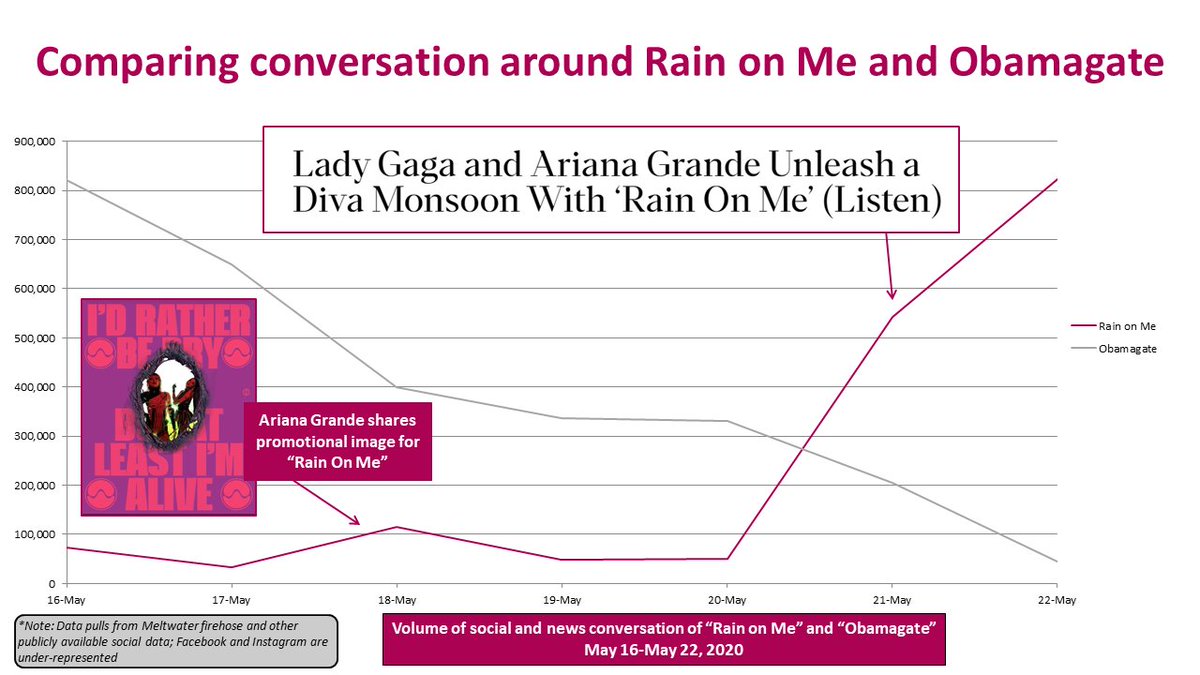I woke up early to look at social media conversation around #RainOnMe  https://abs.twimg.com/hashflags... draggable="false" alt=""> and the numbers are devastating for conspiracy theorists. A great reminder that God is a woman, and good guys can save the day.
https://abs.twimg.com/hashflags... draggable="false" alt=""> and the numbers are devastating for conspiracy theorists. A great reminder that God is a woman, and good guys can save the day.
That little grey box in the bottom explains that this is predominantly Twitter data, which is NOT representative of social media. <25% of Americans spend time here. Read more on that from @PewResearch here: https://www.pewresearch.org/fact-tank/2019/04/10/share-of-u-s-adults-using-social-media-including-facebook-is-mostly-unchanged-since-2018/">https://www.pewresearch.org/fact-tank...
This is obviously a joke, but since you’re all here… truthfully, conspiracies and disinformation present some real problems, and I want to make sure to point folks to some helpful tips and resources. This is like… what I do, so I could go for hours, but let’s throw out a few:
As a general rule, the best response to disinformation is almost always: DO NOT ENGAGE. Engagement is currency on social media, and every like, comment, and share—even if to fact-check—further elevates the content to more people.
When you must engage, focus on the motive of the messenger rather than the claim. People tend to believe trusted messengers, so pointing to WHY an actor may be trying to spread harmful narratives or lies can help remind people to question what they see/hear.
Also, meet people where they are. The best disinformers tap into real concerns people have, like distrust in government and elites. That’s also why people get defensive. Meet them there, and pivot to something proactive.
Prime people to be skeptical! Political discussion is intense, so try non-political examples like this story about Stan Twitter trying to boost streams to show disinfo is everywhere. Swifties, please don’t come for me: https://www.businessinsider.com/taylor-swift-starbucks-deal-hoax-2019-4">https://www.businessinsider.com/taylor-sw...
And—like I said—probably just don’t engage. But if you do, you also have to know when to DISENGAGE if the conversation is unproductive.

 Read on Twitter
Read on Twitter and the numbers are devastating for conspiracy theorists. A great reminder that God is a woman, and good guys can save the day." title="I woke up early to look at social media conversation around #RainOnMe https://abs.twimg.com/hashflags... draggable="false" alt=""> and the numbers are devastating for conspiracy theorists. A great reminder that God is a woman, and good guys can save the day.">
and the numbers are devastating for conspiracy theorists. A great reminder that God is a woman, and good guys can save the day." title="I woke up early to look at social media conversation around #RainOnMe https://abs.twimg.com/hashflags... draggable="false" alt=""> and the numbers are devastating for conspiracy theorists. A great reminder that God is a woman, and good guys can save the day.">
 and the numbers are devastating for conspiracy theorists. A great reminder that God is a woman, and good guys can save the day." title="I woke up early to look at social media conversation around #RainOnMe https://abs.twimg.com/hashflags... draggable="false" alt=""> and the numbers are devastating for conspiracy theorists. A great reminder that God is a woman, and good guys can save the day.">
and the numbers are devastating for conspiracy theorists. A great reminder that God is a woman, and good guys can save the day." title="I woke up early to look at social media conversation around #RainOnMe https://abs.twimg.com/hashflags... draggable="false" alt=""> and the numbers are devastating for conspiracy theorists. A great reminder that God is a woman, and good guys can save the day.">


